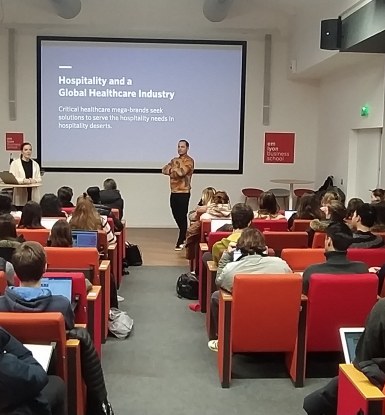Green initiatives are at the forefront of society; everywhere across all industries, companies are trying to find ways to reduce waste and minimize their carbon footprint. We hear things like “sustainability” and “CSR” and “green practices” but what do those topics mean, really? And how do they look when applied specifically to the global industry of hospitality? We sat down with two experts in our MSc International Hospitality Management program to get some answers
What is sustainability?
“Sustainability is a buzzword and 15 years ago it referred to ‘environmental sustainability,’ but more and more it has developed to be the concept that covers 3 pillars of sustainability: environmental, social, and profitability” says expert and PhD in the subject, Henri Kuokkanen, PhD – Institut Paul Bocuse Associate Professor & Academic Vice Dean for Postgraduate Programs.
Sustainable practices in the hospitality industry
“The hospitality industry has a special opportunity compared to other industries (like consumer goods) because there is a lot of interaction with the guests in this sector. Consumer products are bought and taken home to be consumed, and the only thing to connect to the user to the brand is either the packaging or messaging. But in hospitality, we get to have unique customer connections and that enables us to bring sustainability directly into the customer experience” says Henri. Similarly for this reason, “as a service provider, you must really embark your customers into your sustainability policy” says Eric Vogler, PhD – emlyon business school’s Co-Director of the MSc International Hospitality Management.

Our two experts also made it clear that in the hospitality industry, there are certain ways in which it is appropriate and inappropriate to suggest the idea of being more “sustainable” to its clientele, especially at 4 or 5-star resorts, for example. In these luxury resorts, consumers pay for a high-end experience, and therefore have different expectations of service as a result of the price they pay. “Instead of using passive communication, I have an example of a hotel chain that has installed hourglasses in their showers as a way to “gamify CSR” and politely remind guests to be conscious of their water consumption,” says Henri. A further step is to transform stainability into a meaningful customer experience, a topic that Henri has written published papers on, and one that he sees continuing to be a future trend in the industry to help to entice more consumers into partaking in sustainable practices; you can read his recently published papers on the subject here.
The truth about the cost of sustainability for businesses
However, sustainability and CSR, two words that our experts view as synonymous and virtually interchangeable, is not always the easiest to implement in businesses. “As a teacher and a practitioner, we would always like to have a positive impact… but people have in mind that to improve sustainability in businesses is costly, even though this is not necessarily true, it is just a widely held belief,” says Eric. However, “the final objective of sustainability is to better the planet, the world, and our social and natural environment at large, so by definition it is positive,” Eric concludes.
Our experts also gave some examples about how the hospitality industry is moving more towards sustainability in recent decades. Some examples are:
- No more single-use plastic products (ex. Using glassware instead of water bottles)
- Inviting guests to participate in local, community sustainability initiatives
- Hosting events featuring local artists, musicians, and craftsmen to sell their products at hotels
- Creating net zero and net positive carbon emission hospitality environments, to name a few.
Ultimately, a successful business in the hospitality industry needs to have their customers on board with the sustainability initiatives for them to work, and fortunately the younger generations are prioritizing and even seeking out companies with sustainable practices, says Eric.
To see this exclusive webinar in totality, as well as learn how the MSc International Hospitality program (delivered by emlyon business school and Institut Paul Bocuse) educates and immerses students in global sustainability experiences over the course of 18-months, watch the full video on the program’s YouTube channel here.

